An In-Depth Analysis of Karl Marx's Class Theory: A Philosophical View
VerifiedAdded on 2023/06/14
|7
|1893
|199
Essay
AI Summary
This essay provides an opinionated philosophical analysis of Karl Marx's class theory, particularly focusing on the concepts of "class in itself" and "class for itself." It examines Marx's views on class conflict, equality, and the role of class consciousness in driving social change. The essay also presents counterarguments and alternative philosophical perspectives on Marx's ideas, including the importance of private ownership and individual achievement. Ultimately, the author concludes that while equality is essential, it should be achieved through individual effort and capability, rather than being granted as a privilege based on social standing. The analysis considers the potential pitfalls of both unchecked capitalism and unearned equality, advocating for a balanced approach that values both individual merit and social justice. Desklib provides access to this and other solved assignments for students.
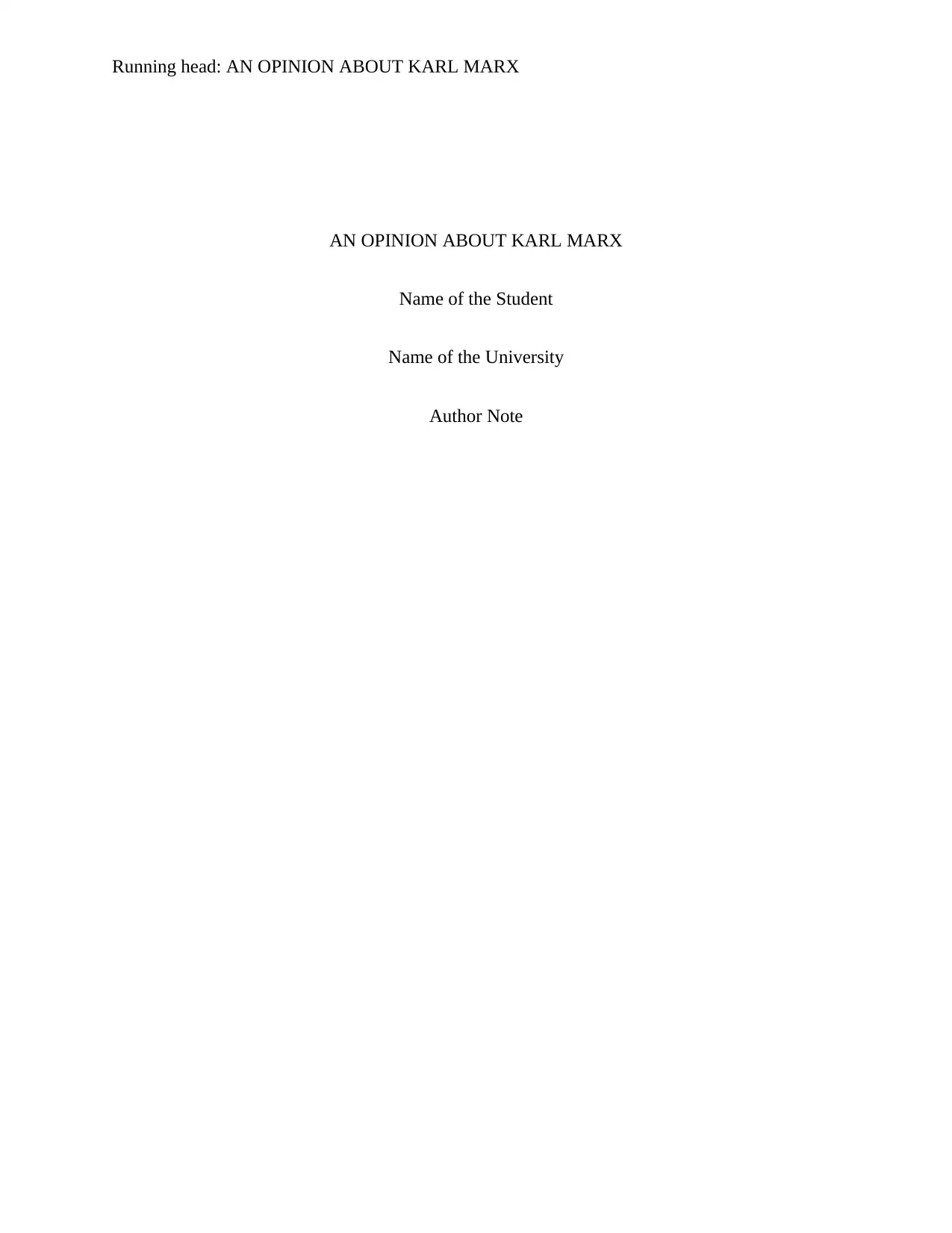
Running head: AN OPINION ABOUT KARL MARX
AN OPINION ABOUT KARL MARX
Name of the Student
Name of the University
Author Note
AN OPINION ABOUT KARL MARX
Name of the Student
Name of the University
Author Note
Paraphrase This Document
Need a fresh take? Get an instant paraphrase of this document with our AI Paraphraser
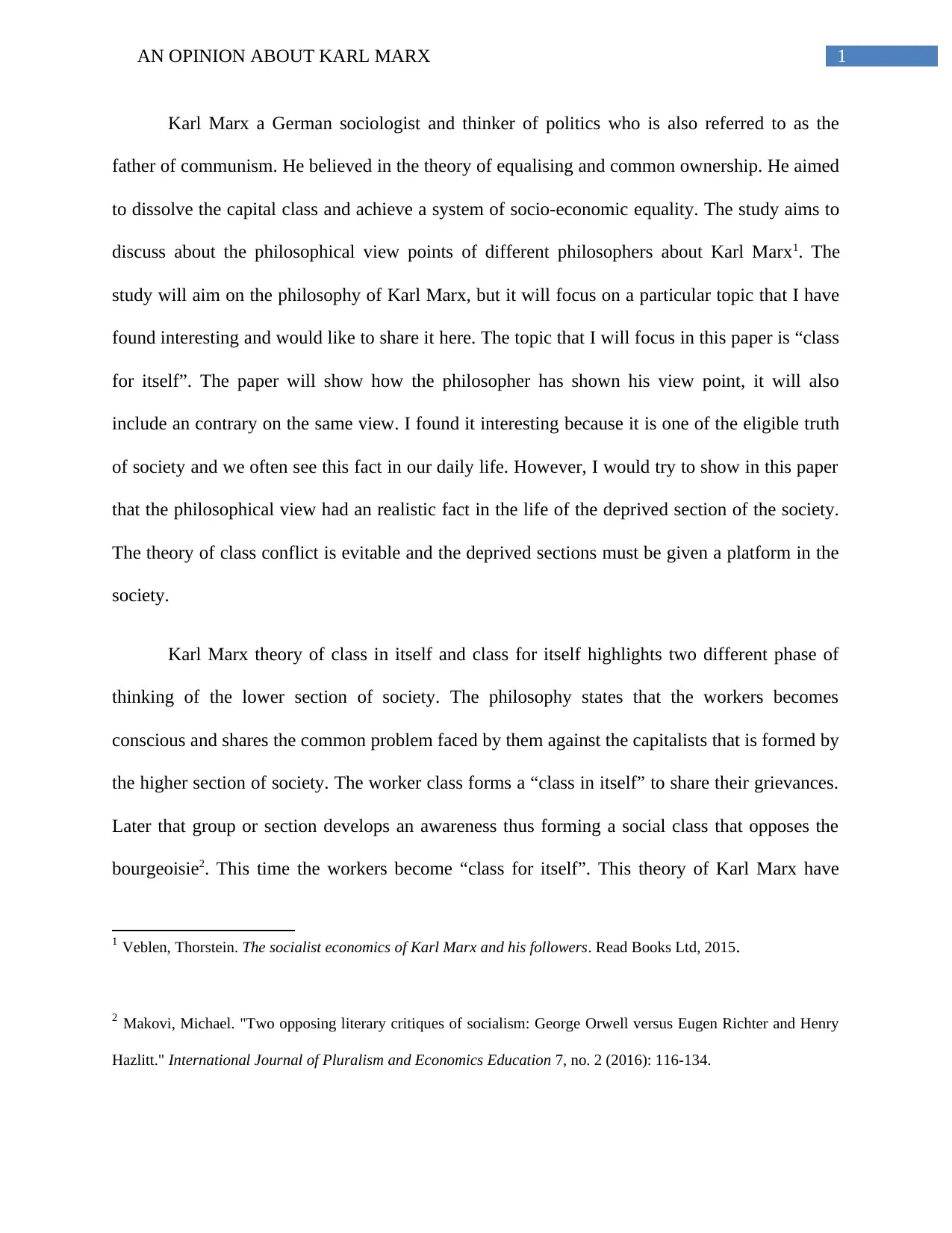
1AN OPINION ABOUT KARL MARX
Karl Marx a German sociologist and thinker of politics who is also referred to as the
father of communism. He believed in the theory of equalising and common ownership. He aimed
to dissolve the capital class and achieve a system of socio-economic equality. The study aims to
discuss about the philosophical view points of different philosophers about Karl Marx1. The
study will aim on the philosophy of Karl Marx, but it will focus on a particular topic that I have
found interesting and would like to share it here. The topic that I will focus in this paper is “class
for itself”. The paper will show how the philosopher has shown his view point, it will also
include an contrary on the same view. I found it interesting because it is one of the eligible truth
of society and we often see this fact in our daily life. However, I would try to show in this paper
that the philosophical view had an realistic fact in the life of the deprived section of the society.
The theory of class conflict is evitable and the deprived sections must be given a platform in the
society.
Karl Marx theory of class in itself and class for itself highlights two different phase of
thinking of the lower section of society. The philosophy states that the workers becomes
conscious and shares the common problem faced by them against the capitalists that is formed by
the higher section of society. The worker class forms a “class in itself” to share their grievances.
Later that group or section develops an awareness thus forming a social class that opposes the
bourgeoisie2. This time the workers become “class for itself”. This theory of Karl Marx have
1 Veblen, Thorstein. The socialist economics of Karl Marx and his followers. Read Books Ltd, 2015.
2 Makovi, Michael. "Two opposing literary critiques of socialism: George Orwell versus Eugen Richter and Henry
Hazlitt." International Journal of Pluralism and Economics Education 7, no. 2 (2016): 116-134.
Karl Marx a German sociologist and thinker of politics who is also referred to as the
father of communism. He believed in the theory of equalising and common ownership. He aimed
to dissolve the capital class and achieve a system of socio-economic equality. The study aims to
discuss about the philosophical view points of different philosophers about Karl Marx1. The
study will aim on the philosophy of Karl Marx, but it will focus on a particular topic that I have
found interesting and would like to share it here. The topic that I will focus in this paper is “class
for itself”. The paper will show how the philosopher has shown his view point, it will also
include an contrary on the same view. I found it interesting because it is one of the eligible truth
of society and we often see this fact in our daily life. However, I would try to show in this paper
that the philosophical view had an realistic fact in the life of the deprived section of the society.
The theory of class conflict is evitable and the deprived sections must be given a platform in the
society.
Karl Marx theory of class in itself and class for itself highlights two different phase of
thinking of the lower section of society. The philosophy states that the workers becomes
conscious and shares the common problem faced by them against the capitalists that is formed by
the higher section of society. The worker class forms a “class in itself” to share their grievances.
Later that group or section develops an awareness thus forming a social class that opposes the
bourgeoisie2. This time the workers become “class for itself”. This theory of Karl Marx have
1 Veblen, Thorstein. The socialist economics of Karl Marx and his followers. Read Books Ltd, 2015.
2 Makovi, Michael. "Two opposing literary critiques of socialism: George Orwell versus Eugen Richter and Henry
Hazlitt." International Journal of Pluralism and Economics Education 7, no. 2 (2016): 116-134.
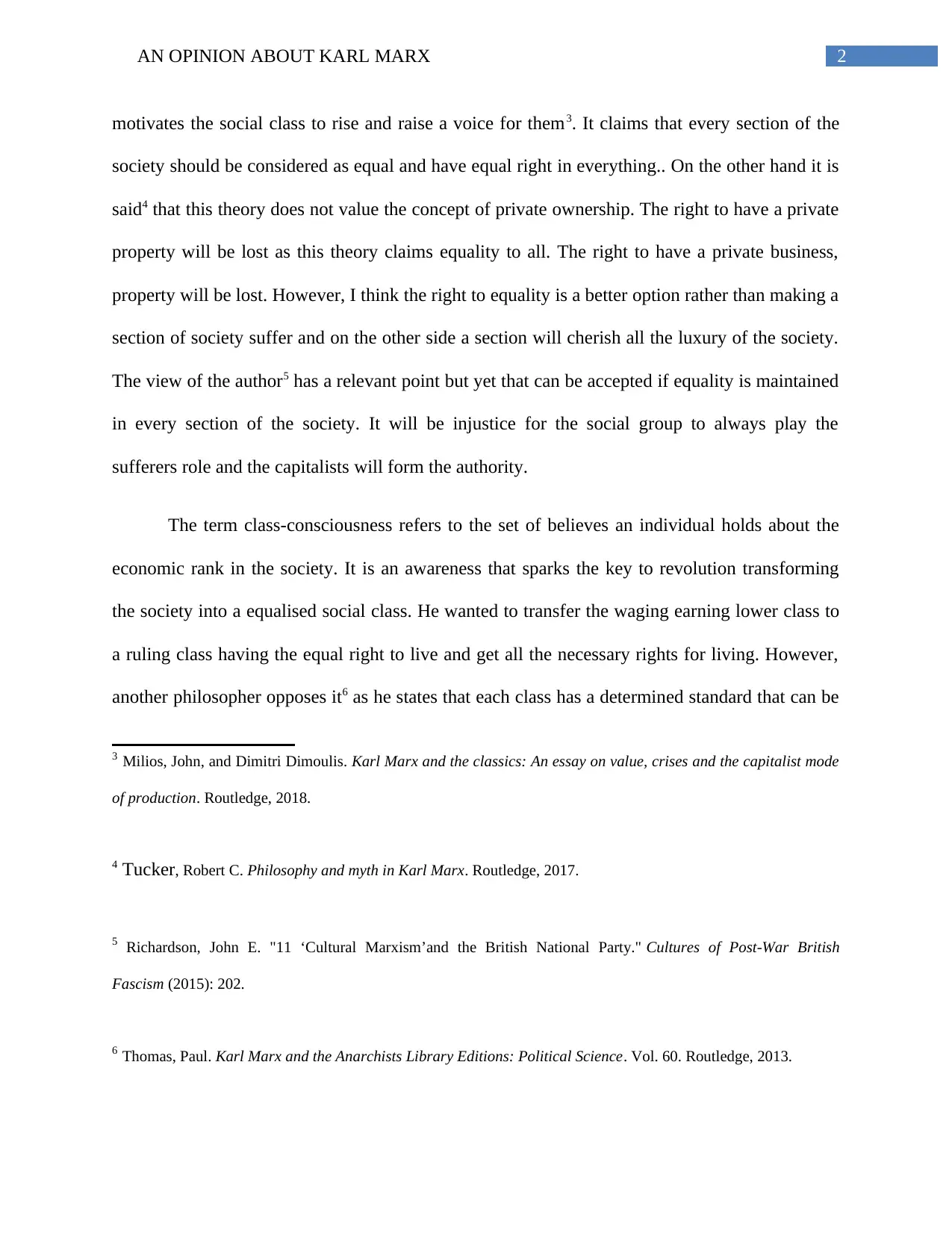
2AN OPINION ABOUT KARL MARX
motivates the social class to rise and raise a voice for them3. It claims that every section of the
society should be considered as equal and have equal right in everything.. On the other hand it is
said4 that this theory does not value the concept of private ownership. The right to have a private
property will be lost as this theory claims equality to all. The right to have a private business,
property will be lost. However, I think the right to equality is a better option rather than making a
section of society suffer and on the other side a section will cherish all the luxury of the society.
The view of the author5 has a relevant point but yet that can be accepted if equality is maintained
in every section of the society. It will be injustice for the social group to always play the
sufferers role and the capitalists will form the authority.
The term class-consciousness refers to the set of believes an individual holds about the
economic rank in the society. It is an awareness that sparks the key to revolution transforming
the society into a equalised social class. He wanted to transfer the waging earning lower class to
a ruling class having the equal right to live and get all the necessary rights for living. However,
another philosopher opposes it6 as he states that each class has a determined standard that can be
3 Milios, John, and Dimitri Dimoulis. Karl Marx and the classics: An essay on value, crises and the capitalist mode
of production. Routledge, 2018.
4 Tucker, Robert C. Philosophy and myth in Karl Marx. Routledge, 2017.
5 Richardson, John E. "11 ‘Cultural Marxism’and the British National Party." Cultures of Post-War British
Fascism (2015): 202.
6 Thomas, Paul. Karl Marx and the Anarchists Library Editions: Political Science. Vol. 60. Routledge, 2013.
motivates the social class to rise and raise a voice for them3. It claims that every section of the
society should be considered as equal and have equal right in everything.. On the other hand it is
said4 that this theory does not value the concept of private ownership. The right to have a private
property will be lost as this theory claims equality to all. The right to have a private business,
property will be lost. However, I think the right to equality is a better option rather than making a
section of society suffer and on the other side a section will cherish all the luxury of the society.
The view of the author5 has a relevant point but yet that can be accepted if equality is maintained
in every section of the society. It will be injustice for the social group to always play the
sufferers role and the capitalists will form the authority.
The term class-consciousness refers to the set of believes an individual holds about the
economic rank in the society. It is an awareness that sparks the key to revolution transforming
the society into a equalised social class. He wanted to transfer the waging earning lower class to
a ruling class having the equal right to live and get all the necessary rights for living. However,
another philosopher opposes it6 as he states that each class has a determined standard that can be
3 Milios, John, and Dimitri Dimoulis. Karl Marx and the classics: An essay on value, crises and the capitalist mode
of production. Routledge, 2018.
4 Tucker, Robert C. Philosophy and myth in Karl Marx. Routledge, 2017.
5 Richardson, John E. "11 ‘Cultural Marxism’and the British National Party." Cultures of Post-War British
Fascism (2015): 202.
6 Thomas, Paul. Karl Marx and the Anarchists Library Editions: Political Science. Vol. 60. Routledge, 2013.
⊘ This is a preview!⊘
Do you want full access?
Subscribe today to unlock all pages.

Trusted by 1+ million students worldwide
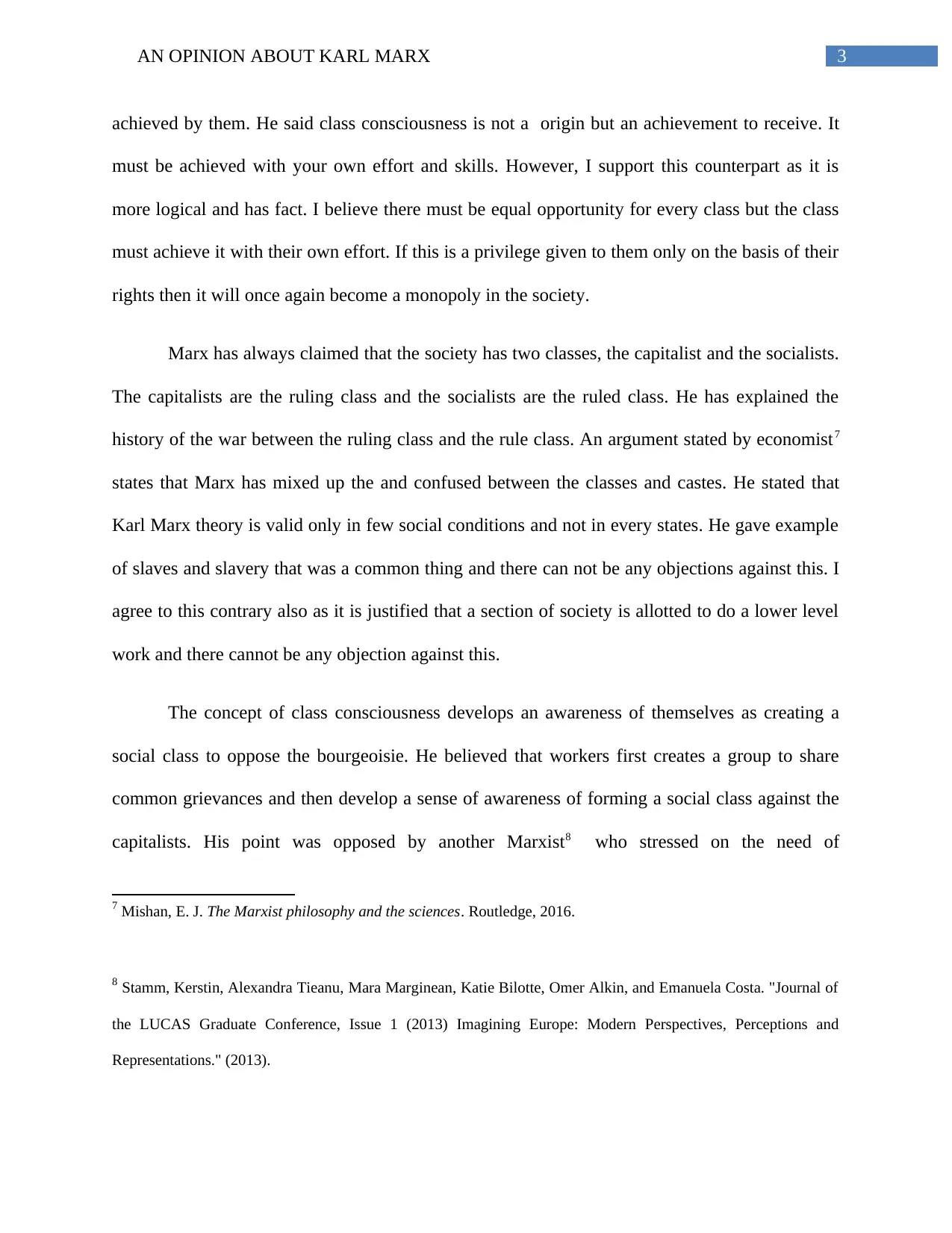
3AN OPINION ABOUT KARL MARX
achieved by them. He said class consciousness is not a origin but an achievement to receive. It
must be achieved with your own effort and skills. However, I support this counterpart as it is
more logical and has fact. I believe there must be equal opportunity for every class but the class
must achieve it with their own effort. If this is a privilege given to them only on the basis of their
rights then it will once again become a monopoly in the society.
Marx has always claimed that the society has two classes, the capitalist and the socialists.
The capitalists are the ruling class and the socialists are the ruled class. He has explained the
history of the war between the ruling class and the rule class. An argument stated by economist7
states that Marx has mixed up the and confused between the classes and castes. He stated that
Karl Marx theory is valid only in few social conditions and not in every states. He gave example
of slaves and slavery that was a common thing and there can not be any objections against this. I
agree to this contrary also as it is justified that a section of society is allotted to do a lower level
work and there cannot be any objection against this.
The concept of class consciousness develops an awareness of themselves as creating a
social class to oppose the bourgeoisie. He believed that workers first creates a group to share
common grievances and then develop a sense of awareness of forming a social class against the
capitalists. His point was opposed by another Marxist8 who stressed on the need of
7 Mishan, E. J. The Marxist philosophy and the sciences. Routledge, 2016.
8 Stamm, Kerstin, Alexandra Tieanu, Mara Marginean, Katie Bilotte, Omer Alkin, and Emanuela Costa. "Journal of
the LUCAS Graduate Conference, Issue 1 (2013) Imagining Europe: Modern Perspectives, Perceptions and
Representations." (2013).
achieved by them. He said class consciousness is not a origin but an achievement to receive. It
must be achieved with your own effort and skills. However, I support this counterpart as it is
more logical and has fact. I believe there must be equal opportunity for every class but the class
must achieve it with their own effort. If this is a privilege given to them only on the basis of their
rights then it will once again become a monopoly in the society.
Marx has always claimed that the society has two classes, the capitalist and the socialists.
The capitalists are the ruling class and the socialists are the ruled class. He has explained the
history of the war between the ruling class and the rule class. An argument stated by economist7
states that Marx has mixed up the and confused between the classes and castes. He stated that
Karl Marx theory is valid only in few social conditions and not in every states. He gave example
of slaves and slavery that was a common thing and there can not be any objections against this. I
agree to this contrary also as it is justified that a section of society is allotted to do a lower level
work and there cannot be any objection against this.
The concept of class consciousness develops an awareness of themselves as creating a
social class to oppose the bourgeoisie. He believed that workers first creates a group to share
common grievances and then develop a sense of awareness of forming a social class against the
capitalists. His point was opposed by another Marxist8 who stressed on the need of
7 Mishan, E. J. The Marxist philosophy and the sciences. Routledge, 2016.
8 Stamm, Kerstin, Alexandra Tieanu, Mara Marginean, Katie Bilotte, Omer Alkin, and Emanuela Costa. "Journal of
the LUCAS Graduate Conference, Issue 1 (2013) Imagining Europe: Modern Perspectives, Perceptions and
Representations." (2013).
Paraphrase This Document
Need a fresh take? Get an instant paraphrase of this document with our AI Paraphraser
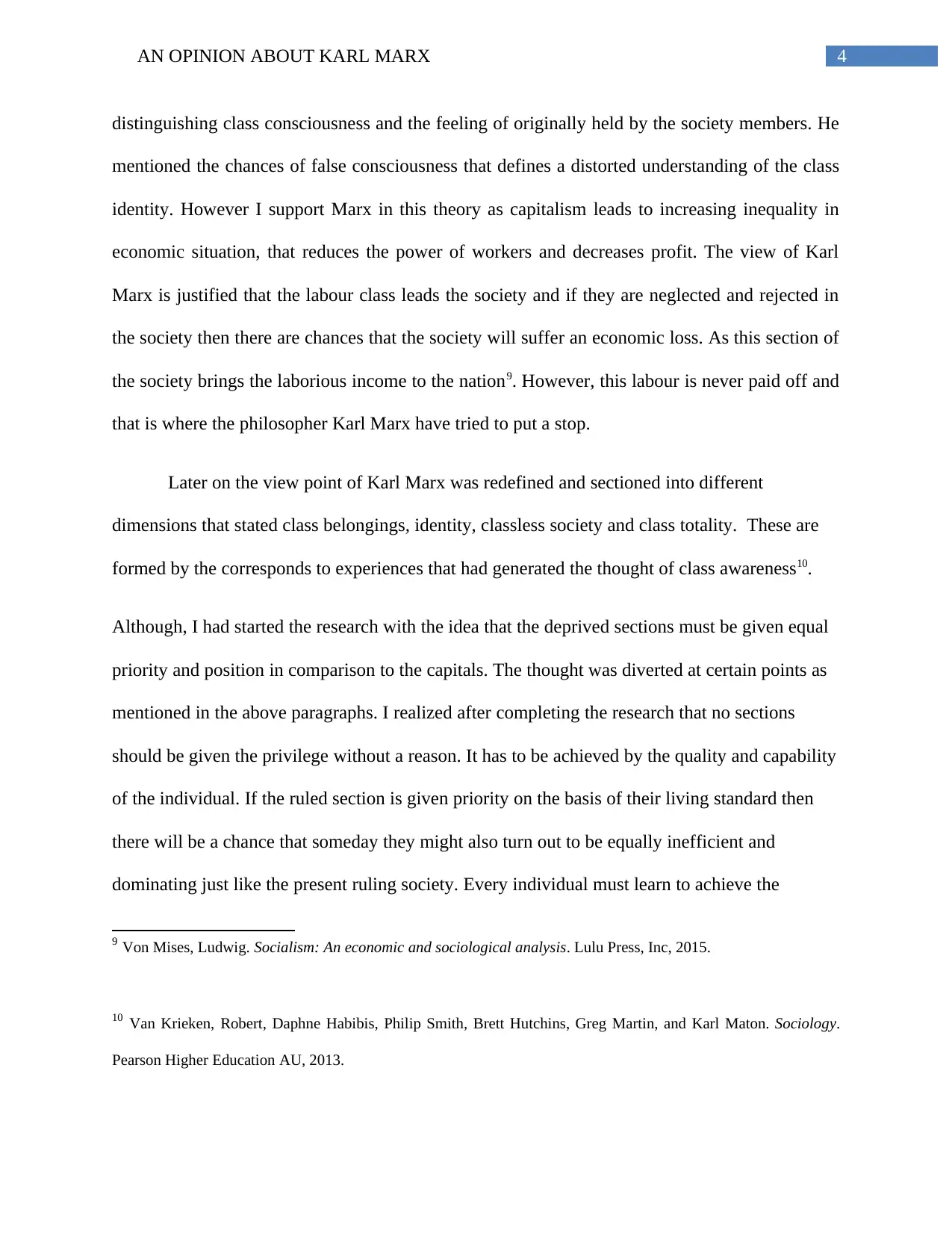
4AN OPINION ABOUT KARL MARX
distinguishing class consciousness and the feeling of originally held by the society members. He
mentioned the chances of false consciousness that defines a distorted understanding of the class
identity. However I support Marx in this theory as capitalism leads to increasing inequality in
economic situation, that reduces the power of workers and decreases profit. The view of Karl
Marx is justified that the labour class leads the society and if they are neglected and rejected in
the society then there are chances that the society will suffer an economic loss. As this section of
the society brings the laborious income to the nation9. However, this labour is never paid off and
that is where the philosopher Karl Marx have tried to put a stop.
Later on the view point of Karl Marx was redefined and sectioned into different
dimensions that stated class belongings, identity, classless society and class totality. These are
formed by the corresponds to experiences that had generated the thought of class awareness10.
Although, I had started the research with the idea that the deprived sections must be given equal
priority and position in comparison to the capitals. The thought was diverted at certain points as
mentioned in the above paragraphs. I realized after completing the research that no sections
should be given the privilege without a reason. It has to be achieved by the quality and capability
of the individual. If the ruled section is given priority on the basis of their living standard then
there will be a chance that someday they might also turn out to be equally inefficient and
dominating just like the present ruling society. Every individual must learn to achieve the
9 Von Mises, Ludwig. Socialism: An economic and sociological analysis. Lulu Press, Inc, 2015.
10 Van Krieken, Robert, Daphne Habibis, Philip Smith, Brett Hutchins, Greg Martin, and Karl Maton. Sociology.
Pearson Higher Education AU, 2013.
distinguishing class consciousness and the feeling of originally held by the society members. He
mentioned the chances of false consciousness that defines a distorted understanding of the class
identity. However I support Marx in this theory as capitalism leads to increasing inequality in
economic situation, that reduces the power of workers and decreases profit. The view of Karl
Marx is justified that the labour class leads the society and if they are neglected and rejected in
the society then there are chances that the society will suffer an economic loss. As this section of
the society brings the laborious income to the nation9. However, this labour is never paid off and
that is where the philosopher Karl Marx have tried to put a stop.
Later on the view point of Karl Marx was redefined and sectioned into different
dimensions that stated class belongings, identity, classless society and class totality. These are
formed by the corresponds to experiences that had generated the thought of class awareness10.
Although, I had started the research with the idea that the deprived sections must be given equal
priority and position in comparison to the capitals. The thought was diverted at certain points as
mentioned in the above paragraphs. I realized after completing the research that no sections
should be given the privilege without a reason. It has to be achieved by the quality and capability
of the individual. If the ruled section is given priority on the basis of their living standard then
there will be a chance that someday they might also turn out to be equally inefficient and
dominating just like the present ruling society. Every individual must learn to achieve the
9 Von Mises, Ludwig. Socialism: An economic and sociological analysis. Lulu Press, Inc, 2015.
10 Van Krieken, Robert, Daphne Habibis, Philip Smith, Brett Hutchins, Greg Martin, and Karl Maton. Sociology.
Pearson Higher Education AU, 2013.
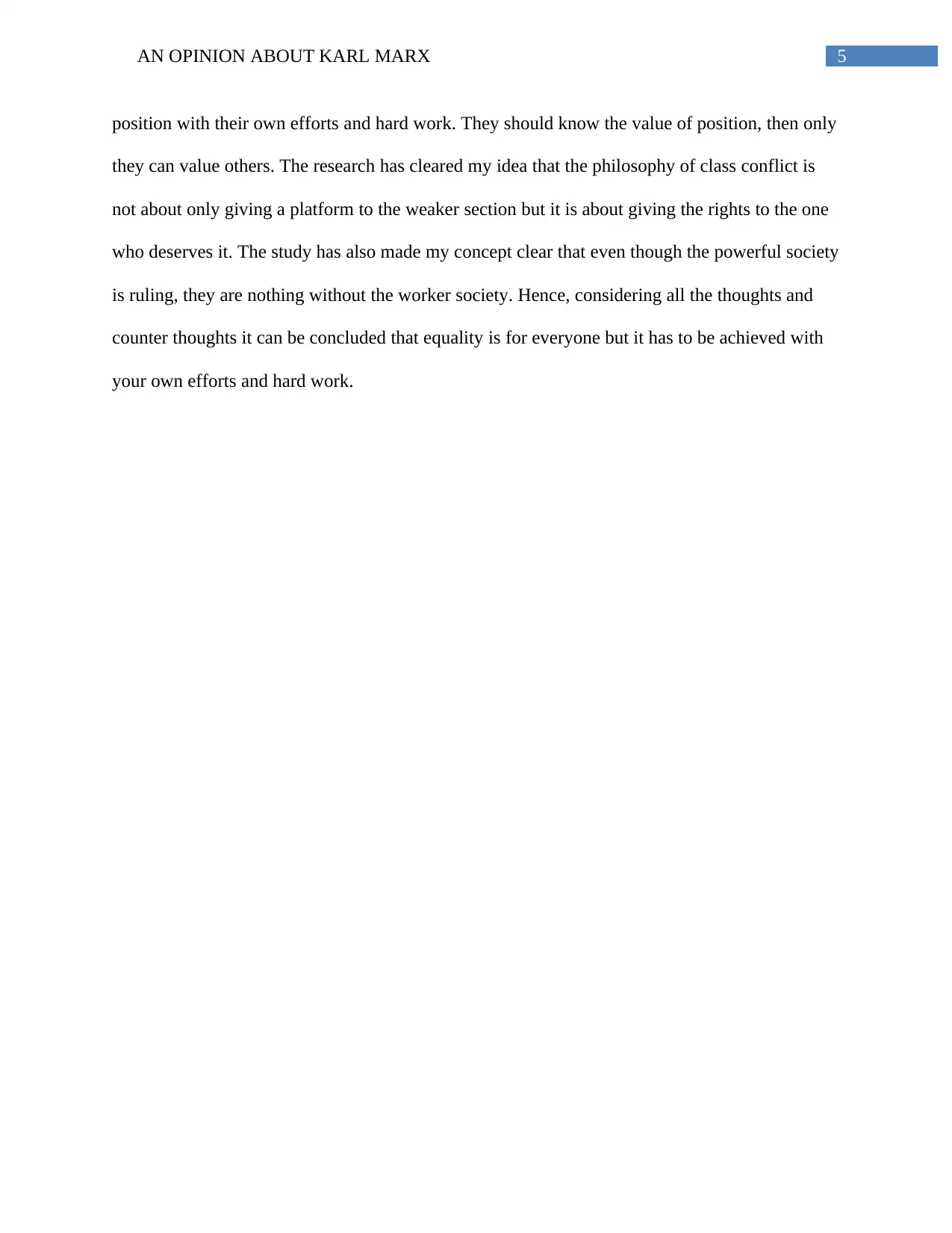
5AN OPINION ABOUT KARL MARX
position with their own efforts and hard work. They should know the value of position, then only
they can value others. The research has cleared my idea that the philosophy of class conflict is
not about only giving a platform to the weaker section but it is about giving the rights to the one
who deserves it. The study has also made my concept clear that even though the powerful society
is ruling, they are nothing without the worker society. Hence, considering all the thoughts and
counter thoughts it can be concluded that equality is for everyone but it has to be achieved with
your own efforts and hard work.
position with their own efforts and hard work. They should know the value of position, then only
they can value others. The research has cleared my idea that the philosophy of class conflict is
not about only giving a platform to the weaker section but it is about giving the rights to the one
who deserves it. The study has also made my concept clear that even though the powerful society
is ruling, they are nothing without the worker society. Hence, considering all the thoughts and
counter thoughts it can be concluded that equality is for everyone but it has to be achieved with
your own efforts and hard work.
⊘ This is a preview!⊘
Do you want full access?
Subscribe today to unlock all pages.

Trusted by 1+ million students worldwide
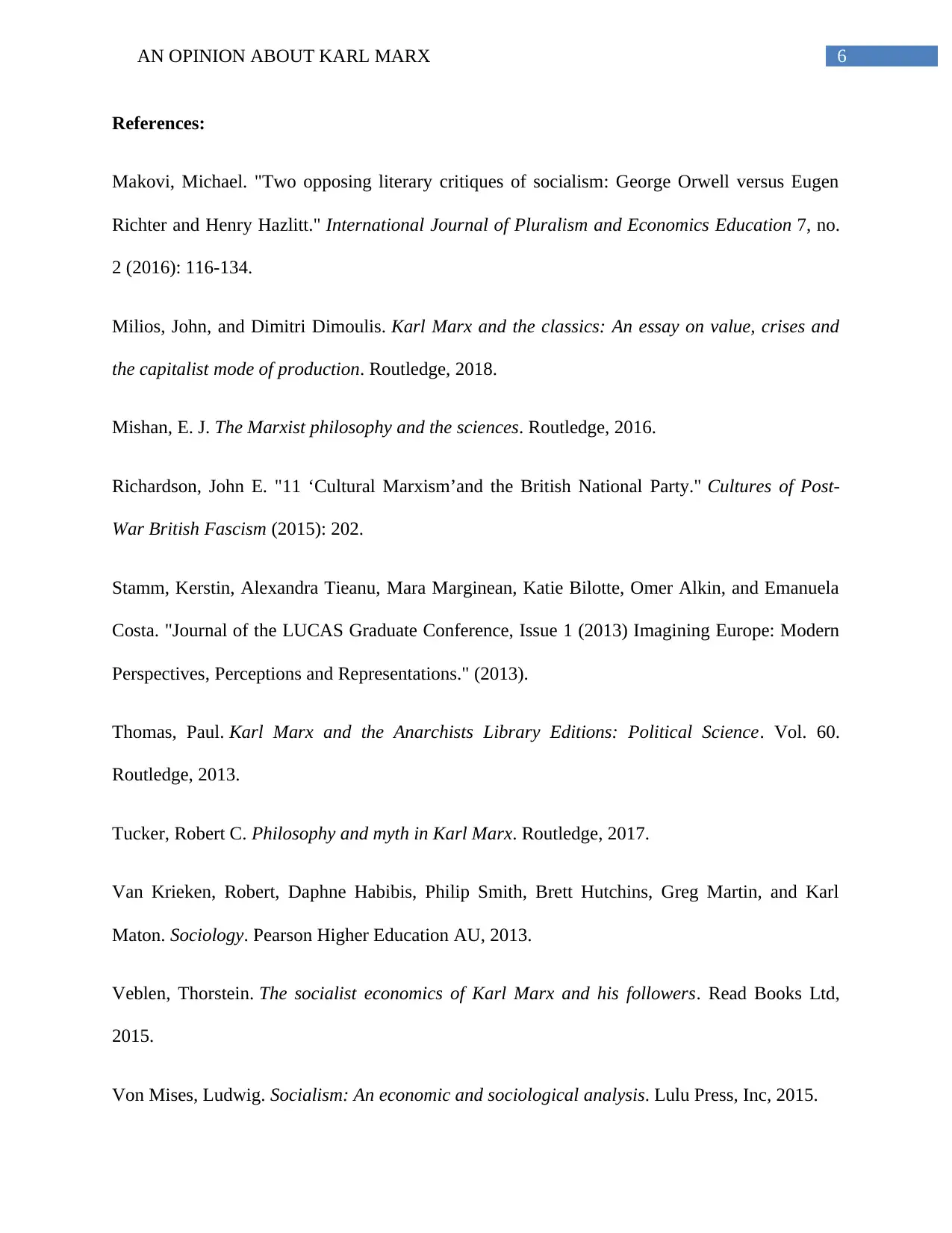
6AN OPINION ABOUT KARL MARX
References:
Makovi, Michael. "Two opposing literary critiques of socialism: George Orwell versus Eugen
Richter and Henry Hazlitt." International Journal of Pluralism and Economics Education 7, no.
2 (2016): 116-134.
Milios, John, and Dimitri Dimoulis. Karl Marx and the classics: An essay on value, crises and
the capitalist mode of production. Routledge, 2018.
Mishan, E. J. The Marxist philosophy and the sciences. Routledge, 2016.
Richardson, John E. "11 ‘Cultural Marxism’and the British National Party." Cultures of Post-
War British Fascism (2015): 202.
Stamm, Kerstin, Alexandra Tieanu, Mara Marginean, Katie Bilotte, Omer Alkin, and Emanuela
Costa. "Journal of the LUCAS Graduate Conference, Issue 1 (2013) Imagining Europe: Modern
Perspectives, Perceptions and Representations." (2013).
Thomas, Paul. Karl Marx and the Anarchists Library Editions: Political Science. Vol. 60.
Routledge, 2013.
Tucker, Robert C. Philosophy and myth in Karl Marx. Routledge, 2017.
Van Krieken, Robert, Daphne Habibis, Philip Smith, Brett Hutchins, Greg Martin, and Karl
Maton. Sociology. Pearson Higher Education AU, 2013.
Veblen, Thorstein. The socialist economics of Karl Marx and his followers. Read Books Ltd,
2015.
Von Mises, Ludwig. Socialism: An economic and sociological analysis. Lulu Press, Inc, 2015.
References:
Makovi, Michael. "Two opposing literary critiques of socialism: George Orwell versus Eugen
Richter and Henry Hazlitt." International Journal of Pluralism and Economics Education 7, no.
2 (2016): 116-134.
Milios, John, and Dimitri Dimoulis. Karl Marx and the classics: An essay on value, crises and
the capitalist mode of production. Routledge, 2018.
Mishan, E. J. The Marxist philosophy and the sciences. Routledge, 2016.
Richardson, John E. "11 ‘Cultural Marxism’and the British National Party." Cultures of Post-
War British Fascism (2015): 202.
Stamm, Kerstin, Alexandra Tieanu, Mara Marginean, Katie Bilotte, Omer Alkin, and Emanuela
Costa. "Journal of the LUCAS Graduate Conference, Issue 1 (2013) Imagining Europe: Modern
Perspectives, Perceptions and Representations." (2013).
Thomas, Paul. Karl Marx and the Anarchists Library Editions: Political Science. Vol. 60.
Routledge, 2013.
Tucker, Robert C. Philosophy and myth in Karl Marx. Routledge, 2017.
Van Krieken, Robert, Daphne Habibis, Philip Smith, Brett Hutchins, Greg Martin, and Karl
Maton. Sociology. Pearson Higher Education AU, 2013.
Veblen, Thorstein. The socialist economics of Karl Marx and his followers. Read Books Ltd,
2015.
Von Mises, Ludwig. Socialism: An economic and sociological analysis. Lulu Press, Inc, 2015.
1 out of 7
Related Documents
Your All-in-One AI-Powered Toolkit for Academic Success.
+13062052269
info@desklib.com
Available 24*7 on WhatsApp / Email
![[object Object]](/_next/static/media/star-bottom.7253800d.svg)
Unlock your academic potential
Copyright © 2020–2026 A2Z Services. All Rights Reserved. Developed and managed by ZUCOL.





